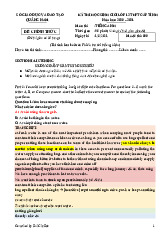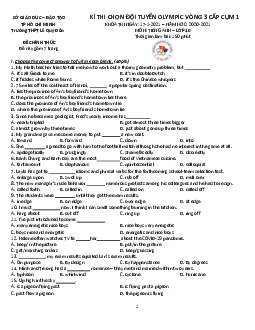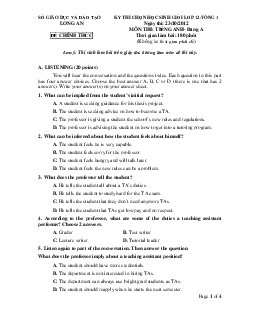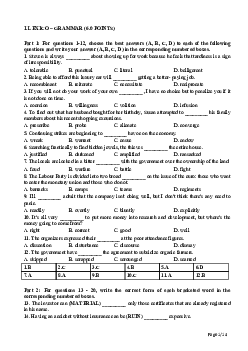



Preview text:
SỞ GIÁO DỤC VÀ ĐÀO TẠO KỲ THI CHỌN HỌC SINH GIỎI THPT CẤP TỈNH LONG AN
NĂM HỌC 2020– 2021 Môn thi: TIẾNG ANH ĐỀ CHÍNH THỨC
Ngày thi: 17/10/2020 (Buổi thi thứ nhất)
Thời gian: 180 phút HƯỚNG DẪN CHẤM (gồm 04 trang)
----------------------------------------------------------------------------------------------------------------- I. LISTENING (40/200 points)
Part 1. (2 points/correct answer) 1. time machine 6. scientific discoveries 2. tenth 7. look at things
3. (a) leather (worker); (a) rubbish (tip) 8. target audience 4. a book 9. advertisement 5. interactive 10. close (down)
Part 2. (2 points/correct answer) 11. academic 14. average 12. sequence 15. most improvement 13. technical ability
Part 3. (2 points/correct answer) 16. nation of shopkeepers 19. flavourings 17. (chronic) labour shortage 20. different specialist 18. affordable
II. READING (50/200 points)
Part 1. (2 point/correct answer) 1.B 2.A 3.A 4.A 5.D 6.C 7.C 8.D 9.B 10.C
Part 2. (2 points/correct answer) 1.E 2.H 3.D 4.F 5.A 6.G 7.B
Part 3. (2 points/correct answer) 1. T 5. F 2. T 6. rain 3. NG 7. (huge) sand (dunes) 4. F 8. fortresses Page 1 of 4
III. USE OF ENGLISH (50/200 points)
Part 1. Lexical and structures (1 point/correct answer) 1.C 2.D 3.A 4.A 5.C 6.D 7.B 8.B 9.C 10.A 11.B 12.A 13.A 14.C 15.B 16.A 17.B 18.D 19.D 20.C
Part 2. Guided cloze text (1 point/correct answer) 1.A 2.D 3.B 4.D 5.C 6.D 7.A 8.C 9.B 10.A
Part 3. Open cloze text (1 point/correct answer) 1. at 2. another 3. every/ any 4. no/ little 5. such 6. was 7. without 8. that/a/this 9. above/ across/ 10. its beyond/over
Part 4. Word formation (1 point/correct answer) 1. fanatics 6. disqualified 2. burning 7. commentator 3. observers 8. referee 4. overpower 9. sharpen 5. maniacs 10. captivating
IV. WRITING (40/200 points)
Part 1. Chart description (10 points) - Content
a. The report MUST cover the following points:
• Introduce the charts (1pt) and state the overall trends & striking features (1pt)
• Describe main features with relevant data from the charts and make relevant comparisons (4pts)
b. The report MUST NOT contain personal opinions.
- Language use (4 points) The report:
• should demonstrate a wide variety of lexical and grammatical structures,
• should have correct use of words (verb tenses, word forms, voice,…); and
mechanics (spelling, punctuations,...). Page 2 of 4 Model answer
The pie charts show changes in spending habits of people in the UK between 1999 and 20 years later, 2019.
As an overall trend, increased amounts of money spent on cars, computers and eating out
were made up for by drops in expenditure on food and books.
In detail, food and cars made up the two biggest item of expenditure in both years. Together
they comprised over half of household spending in the UK. Food accounted for 44 % of
spending in 1999, but this dropped by two thirds to 14 % in 2019. However, the outlay on
cars doubled, rising from 22 % in 1999 to 43 % in 2019.
Other areas changed significantly. Spending on eating out doubled, climbing from 7 % to
14 %. The proportion of salary spent on computers increased dramatically, up from 2 % in
1999 to 12 % in 2019. However, as computer expenditure rose, the percentage of outlay on
books plunged from 6 % to 1 %.
Part 2. Essay (30 points)
Marking scheme (for reference) - The mark given to part 3 is based on the following criteria:
1. Organization (5 points)
a. Ideas are well organized and presented with coherence, cohesion and unity.
b. The essay is well-structured:
✓ Introduction is presented with clear thesis statement.
✓ Body paragraph are written with unity, coherence and cohesion. Each body
paragraph must have a topic sentence and supporting details and examples when necessary.
✓ Conclusion summarizes the main points and offers personal opinions (prediction,
recommendation, consideration ...) on the issue.
2. Content (15 points)
a. All requirements of the task are sufficiently addressed.
b. Ideas are adequately supported and elaborated with relevant and reliable explanations, examples, evidence....
3. Language use (10 points)
a. Demonstration of a variety of topic-related vocabulary.
b. Excellent use and control of grammatical structures (verb tenses, word forms, voice...)
and mechanics (spelling, punctuations...). Page 3 of 4 Model answer
The majority of courses at university nowadays require the completion of group work
which ultimately counts towards your final grade. While some students are perfectly happy
with this arrangement, there are others who consider it totally unfair. Personally, I feel that
while there are many benefits to be gained from group work, a fairer grading system needs to be implemented.
To begin with, students can benefit from group work in a variety of ways. It offers an
ideal opportunity for students to get to know other students who they may never have spoken
to otherwise. This can be especially beneficial to students who find themselves living away
from home for the first time and who are struggling to find their feet. In addition, it can aid
students’ understanding of teamwork. They will come to appreciate the importance of good
communication and the impact it can have on the end result of a project. This will definitely be
an asset when they enter the workplace. Finally, stronger students are in a position where they
can help weaker ones although this would be heavily dependent on the dynamics of the group.
On the other hand, group work can present a number of problems, some of which may
not be apparent at the outset. For instance, some people are born leaders and will assume control
of the group almost immediately. This can cause resentment and lead to conflict amongst the
member of the group, some of whom may feel that mutual cooperation as opposed to one
student overseeing the whole project would be better. Moreover, good students may feel that
they are being held back by less able students or those who are just too lazy to put in much of
an effort. They may struggle to deal with the fact that others will benefit from all their hard
work, or that they may not receive the recognition they deserve for the work they have completed.
In conclusion, while group work can be beneficial, basing students’ grades on the
performance of the group as a whole can be viewed as unjust. I firmly believe that each student
should receive a grade that reflects the amount of work and effort they put into the project. How
this can be achieved though is a question for another day. (383 words) -----HẾT----- Page 4 of 4




